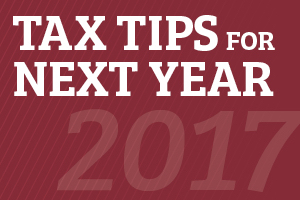Managing the Tax from Your Investments
by Admin | December 1, 2022
April 28, 2017

Another tax year season just wrapped up, so you may be tempted to forget about your taxes for a while. However, now is the exact right time to think about your 2017 tax bill. Managing your taxes proactively can reap rewards.
Capital Gains
When an investor sells an asset at a gain, that is considered a capital gain. Capital gains are considered short-term if the asset was held less than one year, and long-term if greater than one year. Therefore, if you contemplate selling an asset at a gain, pay attention to the timeframe. If you’re just inside that one-year window, consider selling after one year and taking advantage of the lower long-term capital gains tax.
Taxpayers in the 10% and 15% federal brackets pay zero capital gains tax. Those in the 25%, 28%, 33%, or 35% brackets pay a 15% capital gains tax. Lastly, those in the top 39.6% bracket pay a capital gains tax of 20%. Short-term gains are taxed as ordinary income, which generally results in higher taxation. Also, there is a 3.8% tax on net investment income for single taxpayers with modified adjusted gross incomes above $200,000 (and above $250,000 for married couples filing jointly).
A strategy to lower your capital gains bill is to offset gains with losses. When you sell an asset at a loss, you can use that loss to offset gains or reduce taxable income (up to $3,000 per year). Remember to avoid the IRS’s wash sale rule, which disallows the loss if you repurchase that asset within 30 days. One method to adhere to the rule is to invest in a similar asset for at least 30 days, then sell it and reinvest in the original asset, if you so choose.
Beware! Built-in Capital Gains in Mutual Funds
Many investors are not aware that the capital gains generated by mutual fund managers reside inside of those funds. The stock market’s had a good run over the past eight years, so many mutual funds have highly appreciated stocks in their portfolios. If the manager decides to sell some of those securities, the gains are distributed to investors at year-end and are taxable. Be cautious and consider avoiding mutual funds that have large exposure to built-in gains. There are some online services that can help identify this amount, but our suggestion is to have a trusted investment advisor using this as a criteria as they build and adjust your personal investment portfolio.
Consider utilizing the expertise of an investment manager who will focus your portfolio on achieving after-tax returns by reducing your taxation to the extent possible. Also, you should consult your own accounting professional before engaging in any transaction.

